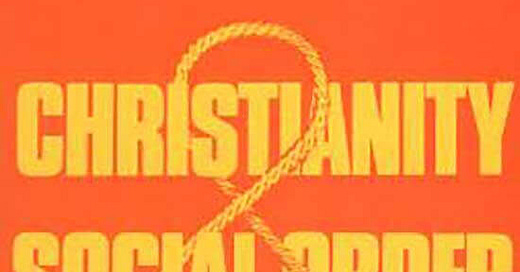Book of the Week: Christianity and the Social Order
William Temple on the Christian contribution to a good society
While I was at Highland Theological College (2005-9), they housed there Archbishop William Temple’s personal library (a slight irony that the library of an English Archbishop of Canterbury ended up in the vaults of an evangelical college in the hinterland of Scotland!).
William Temple was born in 1881, and was a renowned Anglican teacher, preacher and bishop who served as Archbishop of Canterbury, head of the Church of England, from 1942 until his death in 1944. Temple was known for championing social reform and his advocacy of Christian socialism. With perhaps the exception of Michael Ramsay, I don’t think any Archbishop had his intellectual depth and popularity.
Temple was a member of the British Labour Party from 1918 to 1925, his 1942 work Christianity and Social Order sought to intertwine principles of Christian theology and socialist thought, selling 144,000 copies at the time of publication. It is a fine volume that believes Christianity can provide the moral foundations for a socialist society. It’s a book that opines the loss of the church’s moral authority and moral vision when it had much to contribute to the calamitous world of the UK in the 1920s and 30s.
The book begins with “The claim of the Christian Church to make its voice heard in matters of politics and economics is very widely resented, even by those who are Christian in personal belief and in devotional practice” (p. 13). Then there’s also a joke about how a group of bishops in 1926 offered to mediate in a dispute between the coalminers and the government, to which Prime Minister Stanley Baldwin responded by asking the bishops if they would like the Iron and Steel Federation to oversee a revision of the Athanasian Creed. How little things have changed!
Temple is aware that Christianity cannot commit itself to any particular policy or party, also, that Christians will often be divided on a given issue. But that does not justify denying the fact that Christianity does contain a great deal of social teaching which should not be exiled to the basement of quiet piety.
Temple was no communist, but he does point out how the church fathers referred to private property as a consequence of the fall as opposed to an intrinsic good. He doesn’t like the adage, “Gain all you can, give all you can, and do all you can” because the NT nowhere licenses people to “gain all you can.” The accumulation of possessions is never treated as a good or even an instrumental good. Temple admits that riches are not an evil, but a snare!
My favourite part of the book was the section on “freedom.” Temple is rooted in the British liberal tradition of rights and freedoms. People should be free from compulsion and coercion, that said, Temple adds, “Freedom so far as it is a treasure must be freedom for something as well as freedom from something.” Freedom carries responsibilities to control one’s selfish interests: “Freedom, in short, is self-control, self-determination, self-direction. To train citizens in the capacity for freedom and to give them scope for free action is the supreme end of all true politics.” The problem is that people abuse their freedom which is why we need the rule of law.
There is one particular quote I’ll leave you with as I think it’s salient:
Order is to be valued as the basis of freedom; only in a well ordered society are the members of society really ree. If the roads are beset by highwaymen we are not free to travel. Freedom is a finer thing than order, but order is more indispensable than freedom. If freedom is so developed as to turn into anarchy and chaos, men will always accept the alternative of tyranny in hope that order may be restored (p. 82).
Remember those words during the riots, looting, and flag burning that will probably accompany the Democratic National Convention this year!
This is a classic book on British Christian social teaching, I imagine some of my American friends might be appalled at the prospect of a Christian socialist even as a concept, but Temple’s book was very popular in its day and continues to be a classic work on Christian social teaching.





“Basement of quiet piety,” love this phrase! Bravo!
The tension that freedom creates with order is a tricky balance. All the more a challenge when self-government (as proposed by Christianity called self-control) isn’t at the heart of all just societies. Paul’s conversation with Felix, where Luke remembers Felix responded out of fear with the words, “enough!” as Paul talked about righteousness, self-control and the judgment. Not a popular political message for sure!
Someone said, and I can’t remember who, the government that is closest to the people is the best form of government. That would make self-governance (self-control, which is a fruit of the spirit) one of the most important ways of keeping order within the context freedom. It doesn’t solve everything, but it is a better start than totalitarianism which looks to control from the top down.
This message is definitely has something to say to the corporate leaders and those that work for them.